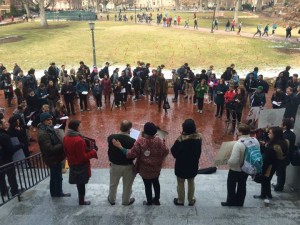Teaching and Research Interests
I am interested in understanding how globalization affects our daily lives. We hear a lot about globalization, yet I do not think we understand it well. I like to approach the issue from the perspective of ordinary people, particularly people whose experiences may be less prominent due to gender, race, class, or sexuality differences. I believe these social relationships offer important insights-and opportunities for critical thinking-on globalization. I consider myself a geographer of labor and livelihoods and I use a broad inclusive notion of work and labor. A feminist question that guides much of my research is: How do transformations in the spatial organization of production influence spatial changes in social reproduction and vice versa?
Much of my research and teaching is focused on Latin America and Latina/os in the United States South. In fact, I got my job at UNC because I had done a lot of research in Mexico that was subsequently published as Women and Work in Mexico’s Maquiladoras (Rowman and Littlefield 1998). I continue to research in Mexico and spend time there whenever possible. However, I am also beginning to examine globalization here in North Carolina by studying the many reasons that Latina/os have moved to our state in the 1980s and 1990s. The United States South has been one of the last parts of the country to experience such massive rapid demographic changes, so local research provides another way for me to think about some of the issues I examined in my Mexico book. By the way, UNC is an amazing place to study Latin America, because of the Institute for the Study of the Americas (ISA), a long-standing interdisciplinary group that includes many Latin American experts. Our university was also the first in the southeastern part of the US to establish a Latina/o Studies Program.
In recent years I have embraced visual communication to reach wider audiences. Specifically, I use collaborative video documentaries as a decolonial methodology and a way to strive for a decolonial aesthetic. I believe this kind of engaged, interdisciplinary, “digital geography” approach is complementary to my earlier work and extends my earlier efforts by allowing me to learn by doing, learn alongside others, and learn with social movement. Links to two of my video documentaries websites are available on this site.
I teach courses on Urban Latin American, Feminist Geography (Space, Place, and Difference, crosslisted with the Women’s and Gender Studies Department), Political Geography and Social Geography. I also teach a First Year Seminar on Local Places in a Globalizing World. If you would like more details on courses I teach or projects I am involved with, please open the link to my curriculum vita, and take a look. Of course, I will be happy to chat on email or in person if you prefer.
